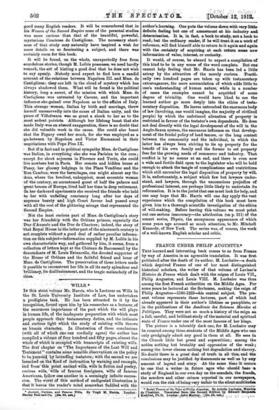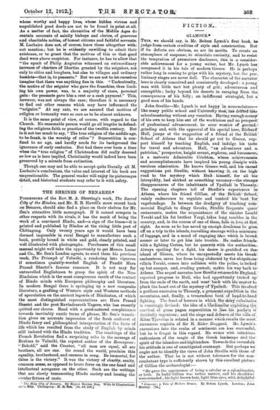FRANCE UNDER PHILIP Al7GUSTUS. * Tars learned and interesting book comes
to us from France by way of America in an agreeable translation. It was first published after the death of its author, M. Luchaire—a death which deprived France of one 'of her most distinguished historical scholars, the writer of that volume of Lavisse's Histoire de France which dealt with the reigns of Louis VII., Philip Augustus, and Louis VIII. IL Luchaire was thus among the first French authorities on the Middle Ages. For some years he lectured at the Sorbonne, making the reign of Philip Augustus-1180-1223--his central subject. The pre- sent volume represents these lectures, part of which had already appeared in their author's lifetime as pamphlets, or in the publications of the Academic des Sciences Morales et Folitiques. They were not so much a history of the reign as a full, careful, and brilliant study of the material and spiritual state of France under one of the most famous of her kings.
The picture is a tolerably dark one, for M. Luchaire may be counted among those students of the Middle Ages who can only grudgingly admit any good in them- at all. He sees in the Church little but greed and superstition ; among the nobles nothing but brutality and oppression of the weak; among the lower classes nothing but degradation andslavery. No doubt there is a great deal of truth in all this, and -the conclusions may be justified -by documents an' well =asby awy amount of legend and story; 'At the same time it occurs- to one that a writer in future 'ages who should -bue study of England in our own day on theseandals, the frauds, the murders and other crimes -reported in our nevispapera, would run the risk of beingvery Unfair to the silent multitndea • Social -Prance at the Tune of Philip ebigushut By Achille Luchaire, !Sombre de rInetitut. Te,asletad 'train '4148. Second Edition by Edward -Maimed* Yrehbiel Ph.D. Londos.:..,118hri liurray. [108.134. net.] ,
whose worthy and happy lives, whose hidden virtues and unpublished good deeds are not to be found in print at all. As a matter of fact, the chronicles of the Middle Ages do contain accounts of saintly bishops and cleric, of generous and charitable nobles, of honest.citizens and faithful servants.
Luchaire does not, of course, leave these altogether with. out mention ; but he is- evidently- unwilling _to admit their existence, or to grant that the motives of this or that good deed were above suspicion. For instance, he has to allow that "the epoch of Philip Augustus witnessed an extraordinary izmrease of charters of liberties granted by the aeigniors, not only to cities and burghers, but-also to villages and ordinary hamleta--that is, to peasants." But we are not to let ourselves imagine that there was anything fine in this. " Undoubtedly, the motive of the seignior who gave the franchise, thus limit- ing his own power, was, in a majority of cases, personal gtdn: the peasants gave him a rent or a cash payment." This, however, was not always 'the case; therefore it is necessary th find out other reasons which may have influenced the `seignior." At any rate, we are assured that motives of religion or humanity were so rare as to be almost unknown.
It is the same point of view, of course, with regard to. the Church. No reasonable person would go all lengths in defend- ing the religious faith or practice of the twelfth century. But isit not too mueh to say, `• The true religion of the middle age, to be freak, is the worship of relics "? Superstition is con- fined to no age, and hardly needs for its background the ignorance of early centuries. But had there ever been a time wheat the "true religion" of Christendom did really descend so low as is here implied, Christianity would indeed have been preserved by a miracle from extinction.
Though one may not be able to accept quite literally all M. Luctaire's conclusions, the value and interest of his book are unquestionable. The general reader will enjoy its picturesque detail, and historical students may refer to it with safety.











































 Previous page
Previous page